Principles of Care: Legislation & Impact on Healthcare Practice
VerifiedAdded on 2023/06/05
|13
|3075
|255
Essay
AI Summary
This essay provides a comprehensive analysis of the principles of care within health and social care systems. It begins by introducing the foundational role of these principles in delivering quality medical services, emphasizing their accessibility and importance in safeguarding patient well-being. The essay delves into how these principles are implemented, highlighting the person-centered approach and adherence to relevant legislation and codes of practice. It critically examines the impact of various legislations such as the Data Protection Act, Care Standard Act, Equality Act, and Mental Health Act on care practices, particularly in protecting vulnerable individuals. Furthermore, the discussion extends to the concept of patient autonomy and its implications for the rights of vulnerable populations. The essay also illustrates the significance of these principles using Maslow's Hierarchy of Needs, demonstrating how healthcare providers can identify and address unmet patient needs. Finally, it touches upon risk management and behavioral considerations within the framework of care principles.
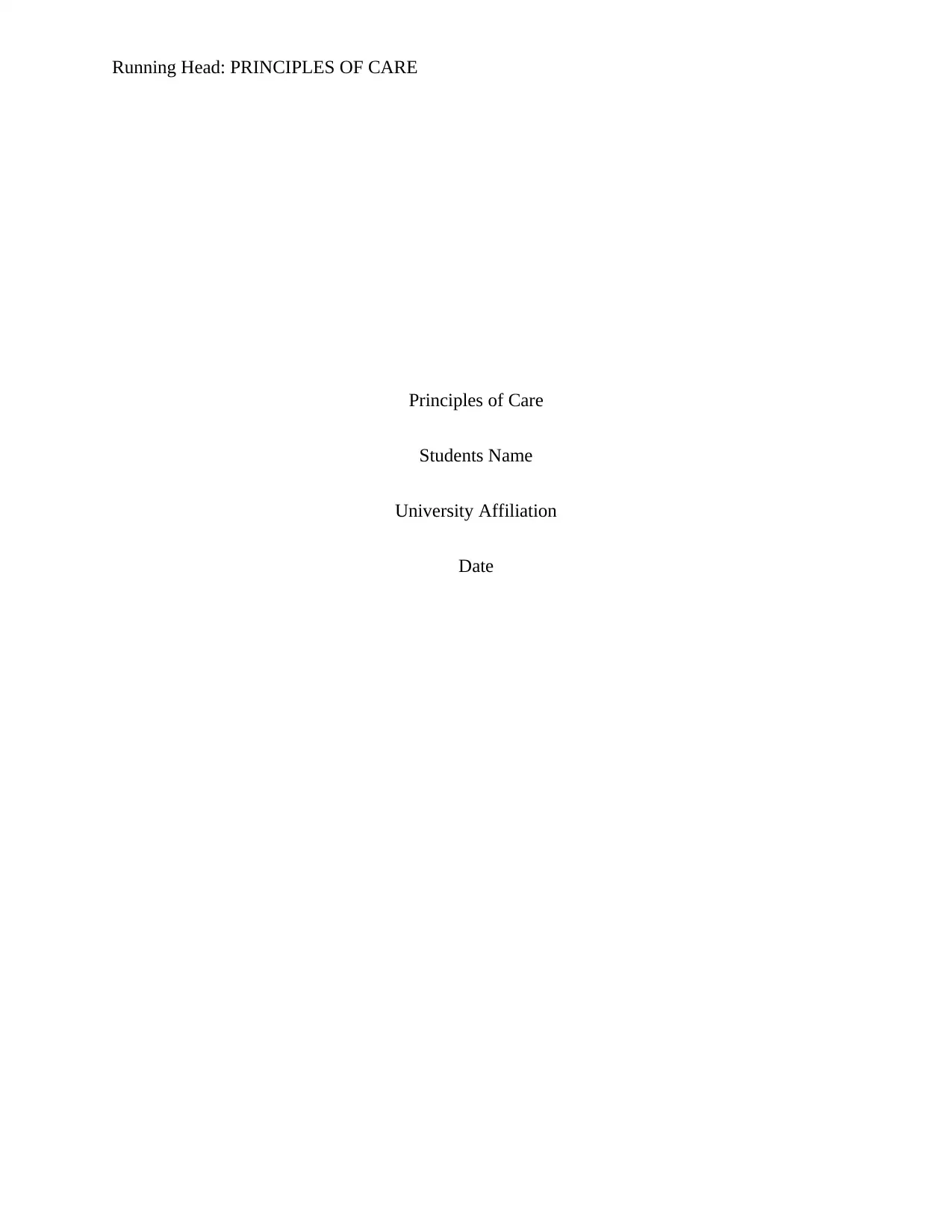
Running Head: PRINCIPLES OF CARE
Principles of Care
Students Name
University Affiliation
Date
Principles of Care
Students Name
University Affiliation
Date
Paraphrase This Document
Need a fresh take? Get an instant paraphrase of this document with our AI Paraphraser
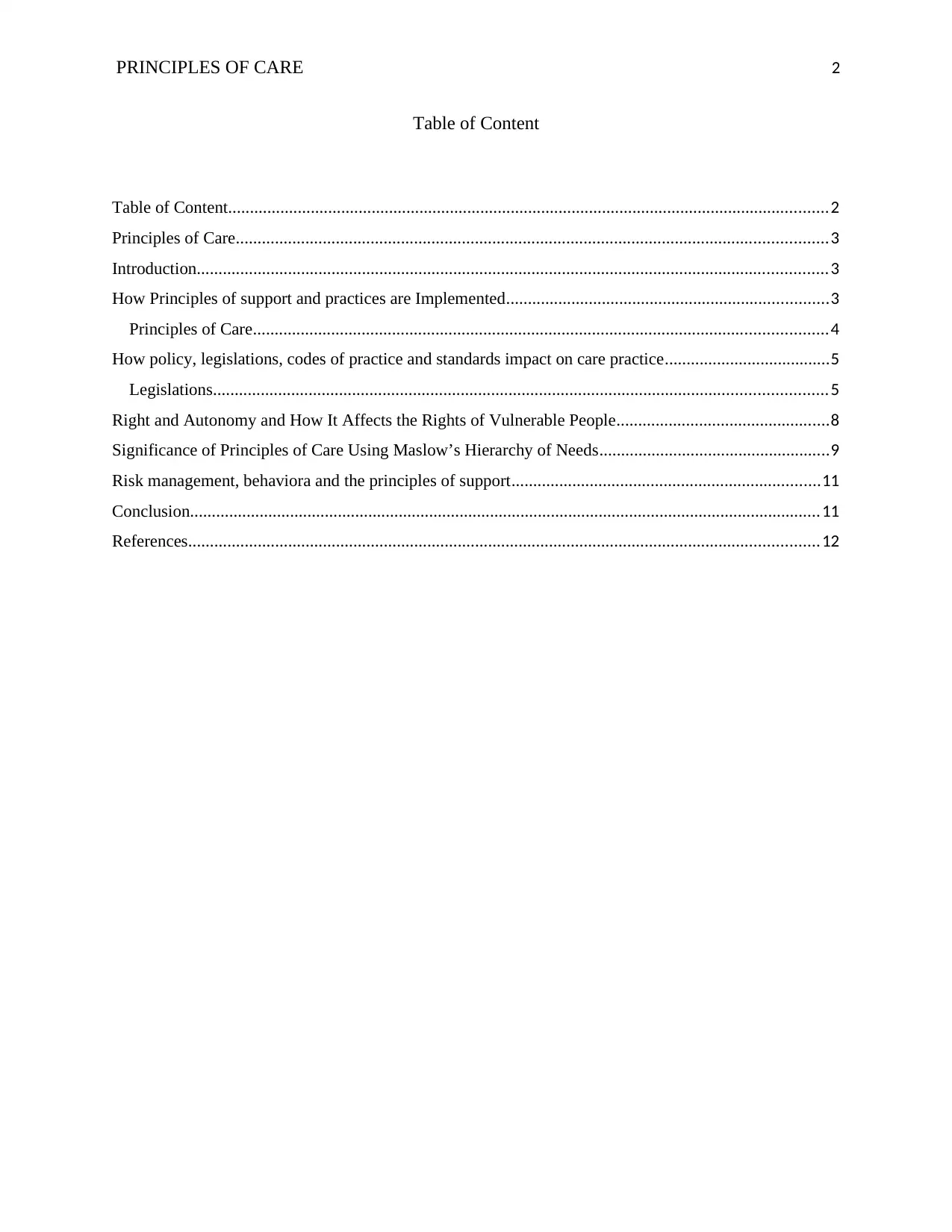
PRINCIPLES OF CARE 2
Table of Content
Table of Content..........................................................................................................................................2
Principles of Care........................................................................................................................................3
Introduction.................................................................................................................................................3
How Principles of support and practices are Implemented..........................................................................3
Principles of Care....................................................................................................................................4
How policy, legislations, codes of practice and standards impact on care practice......................................5
Legislations.............................................................................................................................................5
Right and Autonomy and How It Affects the Rights of Vulnerable People.................................................8
Significance of Principles of Care Using Maslow’s Hierarchy of Needs.....................................................9
Risk management, behaviora and the principles of support.......................................................................11
Conclusion.................................................................................................................................................11
References.................................................................................................................................................12
Table of Content
Table of Content..........................................................................................................................................2
Principles of Care........................................................................................................................................3
Introduction.................................................................................................................................................3
How Principles of support and practices are Implemented..........................................................................3
Principles of Care....................................................................................................................................4
How policy, legislations, codes of practice and standards impact on care practice......................................5
Legislations.............................................................................................................................................5
Right and Autonomy and How It Affects the Rights of Vulnerable People.................................................8
Significance of Principles of Care Using Maslow’s Hierarchy of Needs.....................................................9
Risk management, behaviora and the principles of support.......................................................................11
Conclusion.................................................................................................................................................11
References.................................................................................................................................................12
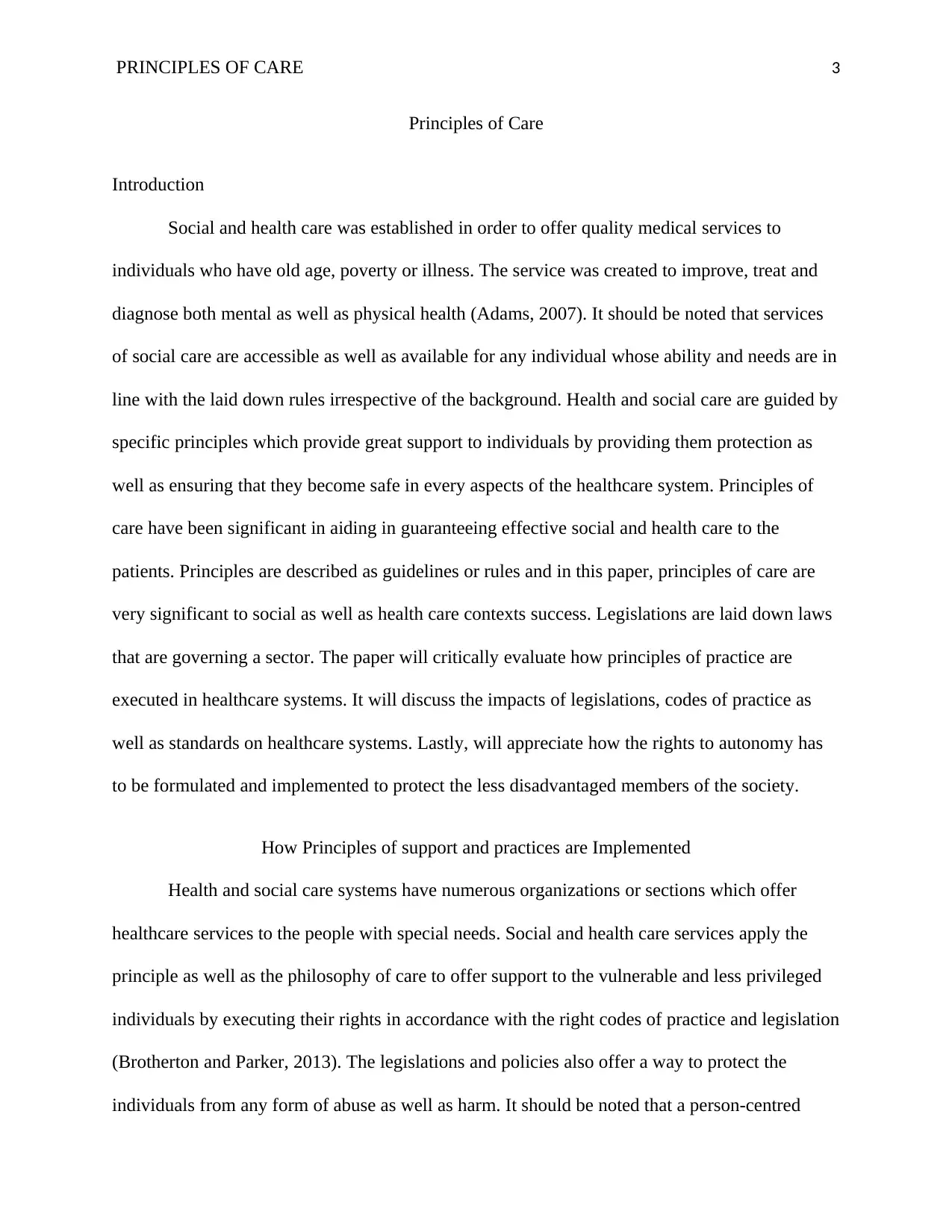
PRINCIPLES OF CARE 3
Principles of Care
Introduction
Social and health care was established in order to offer quality medical services to
individuals who have old age, poverty or illness. The service was created to improve, treat and
diagnose both mental as well as physical health (Adams, 2007). It should be noted that services
of social care are accessible as well as available for any individual whose ability and needs are in
line with the laid down rules irrespective of the background. Health and social care are guided by
specific principles which provide great support to individuals by providing them protection as
well as ensuring that they become safe in every aspects of the healthcare system. Principles of
care have been significant in aiding in guaranteeing effective social and health care to the
patients. Principles are described as guidelines or rules and in this paper, principles of care are
very significant to social as well as health care contexts success. Legislations are laid down laws
that are governing a sector. The paper will critically evaluate how principles of practice are
executed in healthcare systems. It will discuss the impacts of legislations, codes of practice as
well as standards on healthcare systems. Lastly, will appreciate how the rights to autonomy has
to be formulated and implemented to protect the less disadvantaged members of the society.
How Principles of support and practices are Implemented
Health and social care systems have numerous organizations or sections which offer
healthcare services to the people with special needs. Social and health care services apply the
principle as well as the philosophy of care to offer support to the vulnerable and less privileged
individuals by executing their rights in accordance with the right codes of practice and legislation
(Brotherton and Parker, 2013). The legislations and policies also offer a way to protect the
individuals from any form of abuse as well as harm. It should be noted that a person-centred
Principles of Care
Introduction
Social and health care was established in order to offer quality medical services to
individuals who have old age, poverty or illness. The service was created to improve, treat and
diagnose both mental as well as physical health (Adams, 2007). It should be noted that services
of social care are accessible as well as available for any individual whose ability and needs are in
line with the laid down rules irrespective of the background. Health and social care are guided by
specific principles which provide great support to individuals by providing them protection as
well as ensuring that they become safe in every aspects of the healthcare system. Principles of
care have been significant in aiding in guaranteeing effective social and health care to the
patients. Principles are described as guidelines or rules and in this paper, principles of care are
very significant to social as well as health care contexts success. Legislations are laid down laws
that are governing a sector. The paper will critically evaluate how principles of practice are
executed in healthcare systems. It will discuss the impacts of legislations, codes of practice as
well as standards on healthcare systems. Lastly, will appreciate how the rights to autonomy has
to be formulated and implemented to protect the less disadvantaged members of the society.
How Principles of support and practices are Implemented
Health and social care systems have numerous organizations or sections which offer
healthcare services to the people with special needs. Social and health care services apply the
principle as well as the philosophy of care to offer support to the vulnerable and less privileged
individuals by executing their rights in accordance with the right codes of practice and legislation
(Brotherton and Parker, 2013). The legislations and policies also offer a way to protect the
individuals from any form of abuse as well as harm. It should be noted that a person-centred
⊘ This is a preview!⊘
Do you want full access?
Subscribe today to unlock all pages.

Trusted by 1+ million students worldwide
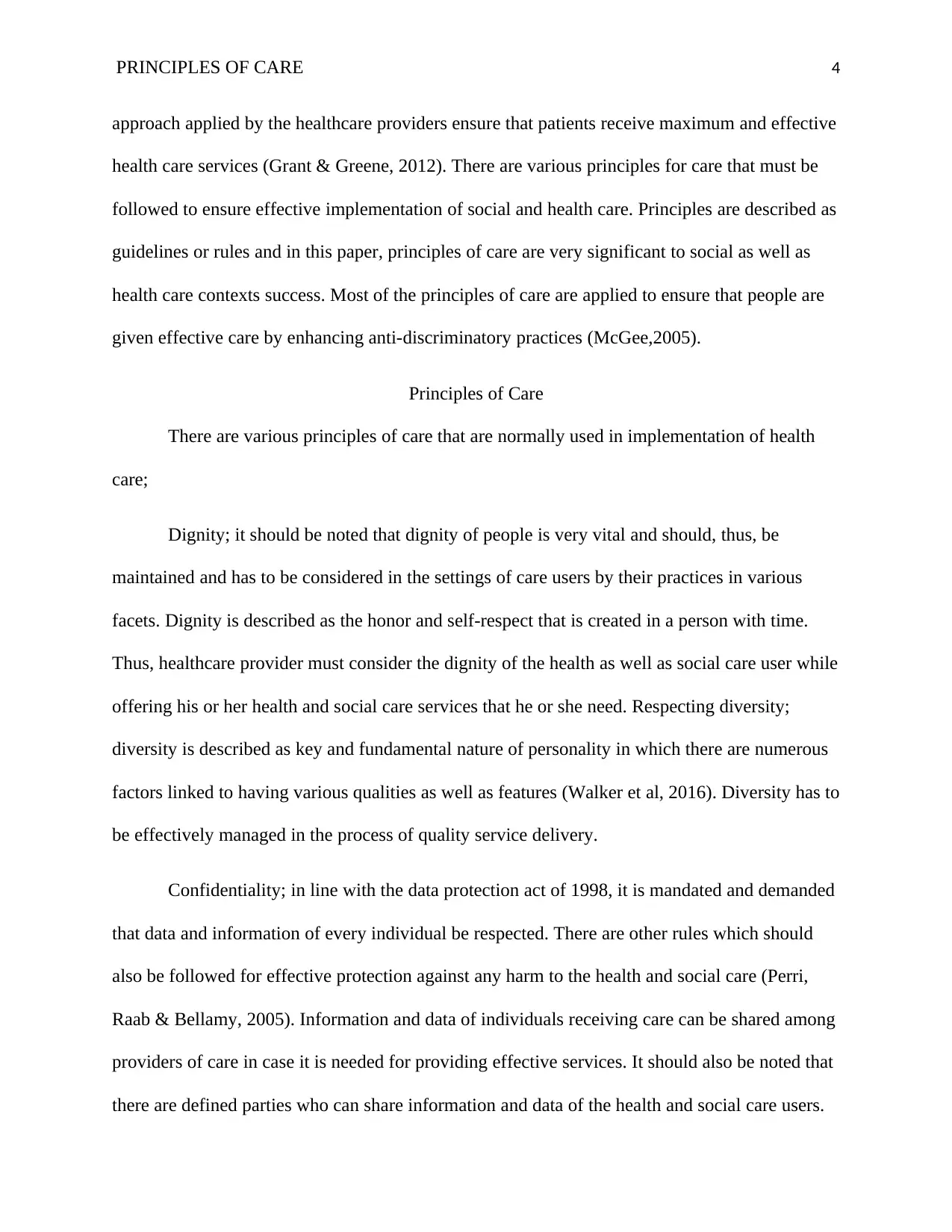
PRINCIPLES OF CARE 4
approach applied by the healthcare providers ensure that patients receive maximum and effective
health care services (Grant & Greene, 2012). There are various principles for care that must be
followed to ensure effective implementation of social and health care. Principles are described as
guidelines or rules and in this paper, principles of care are very significant to social as well as
health care contexts success. Most of the principles of care are applied to ensure that people are
given effective care by enhancing anti-discriminatory practices (McGee,2005).
Principles of Care
There are various principles of care that are normally used in implementation of health
care;
Dignity; it should be noted that dignity of people is very vital and should, thus, be
maintained and has to be considered in the settings of care users by their practices in various
facets. Dignity is described as the honor and self-respect that is created in a person with time.
Thus, healthcare provider must consider the dignity of the health as well as social care user while
offering his or her health and social care services that he or she need. Respecting diversity;
diversity is described as key and fundamental nature of personality in which there are numerous
factors linked to having various qualities as well as features (Walker et al, 2016). Diversity has to
be effectively managed in the process of quality service delivery.
Confidentiality; in line with the data protection act of 1998, it is mandated and demanded
that data and information of every individual be respected. There are other rules which should
also be followed for effective protection against any harm to the health and social care (Perri,
Raab & Bellamy, 2005). Information and data of individuals receiving care can be shared among
providers of care in case it is needed for providing effective services. It should also be noted that
there are defined parties who can share information and data of the health and social care users.
approach applied by the healthcare providers ensure that patients receive maximum and effective
health care services (Grant & Greene, 2012). There are various principles for care that must be
followed to ensure effective implementation of social and health care. Principles are described as
guidelines or rules and in this paper, principles of care are very significant to social as well as
health care contexts success. Most of the principles of care are applied to ensure that people are
given effective care by enhancing anti-discriminatory practices (McGee,2005).
Principles of Care
There are various principles of care that are normally used in implementation of health
care;
Dignity; it should be noted that dignity of people is very vital and should, thus, be
maintained and has to be considered in the settings of care users by their practices in various
facets. Dignity is described as the honor and self-respect that is created in a person with time.
Thus, healthcare provider must consider the dignity of the health as well as social care user while
offering his or her health and social care services that he or she need. Respecting diversity;
diversity is described as key and fundamental nature of personality in which there are numerous
factors linked to having various qualities as well as features (Walker et al, 2016). Diversity has to
be effectively managed in the process of quality service delivery.
Confidentiality; in line with the data protection act of 1998, it is mandated and demanded
that data and information of every individual be respected. There are other rules which should
also be followed for effective protection against any harm to the health and social care (Perri,
Raab & Bellamy, 2005). Information and data of individuals receiving care can be shared among
providers of care in case it is needed for providing effective services. It should also be noted that
there are defined parties who can share information and data of the health and social care users.
Paraphrase This Document
Need a fresh take? Get an instant paraphrase of this document with our AI Paraphraser
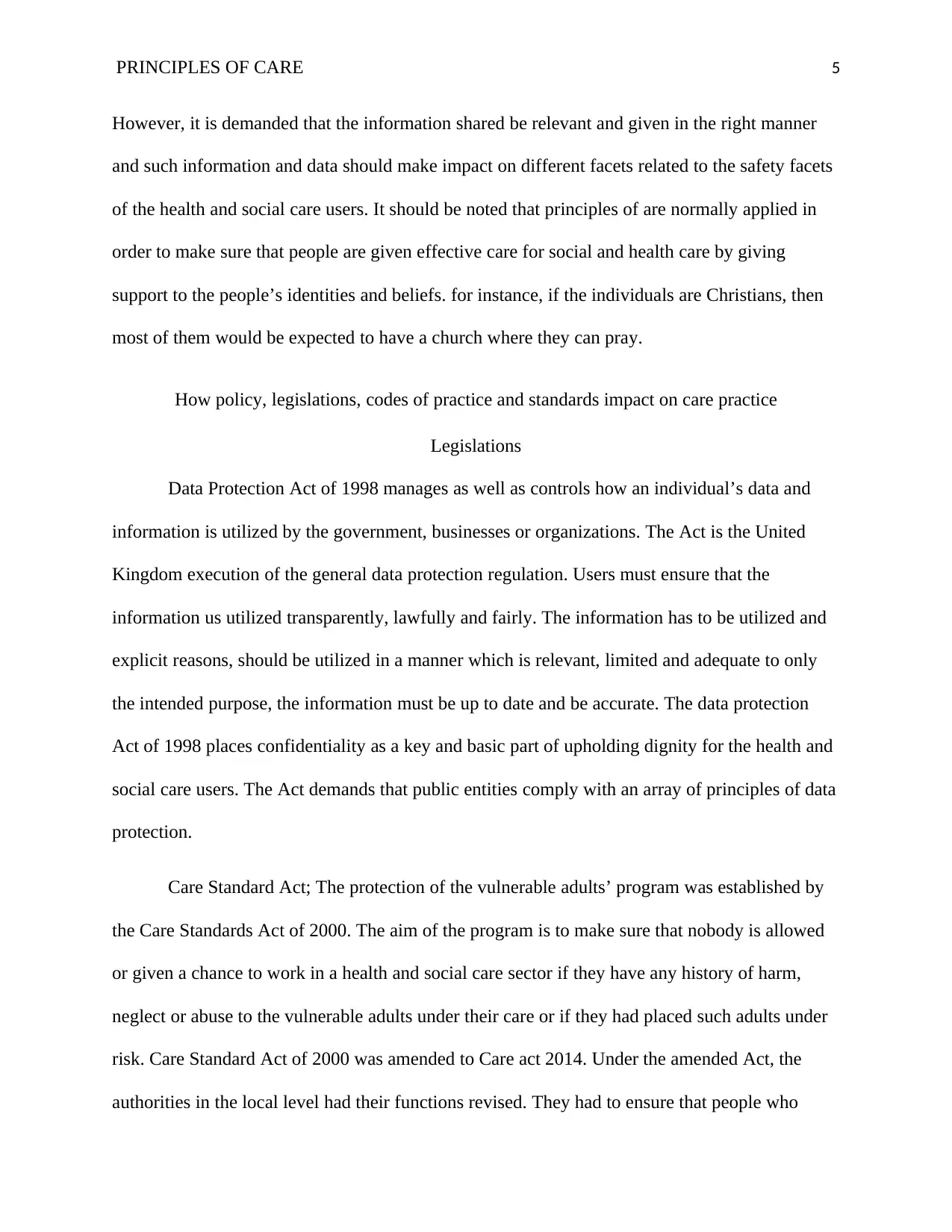
PRINCIPLES OF CARE 5
However, it is demanded that the information shared be relevant and given in the right manner
and such information and data should make impact on different facets related to the safety facets
of the health and social care users. It should be noted that principles of are normally applied in
order to make sure that people are given effective care for social and health care by giving
support to the people’s identities and beliefs. for instance, if the individuals are Christians, then
most of them would be expected to have a church where they can pray.
How policy, legislations, codes of practice and standards impact on care practice
Legislations
Data Protection Act of 1998 manages as well as controls how an individual’s data and
information is utilized by the government, businesses or organizations. The Act is the United
Kingdom execution of the general data protection regulation. Users must ensure that the
information us utilized transparently, lawfully and fairly. The information has to be utilized and
explicit reasons, should be utilized in a manner which is relevant, limited and adequate to only
the intended purpose, the information must be up to date and be accurate. The data protection
Act of 1998 places confidentiality as a key and basic part of upholding dignity for the health and
social care users. The Act demands that public entities comply with an array of principles of data
protection.
Care Standard Act; The protection of the vulnerable adults’ program was established by
the Care Standards Act of 2000. The aim of the program is to make sure that nobody is allowed
or given a chance to work in a health and social care sector if they have any history of harm,
neglect or abuse to the vulnerable adults under their care or if they had placed such adults under
risk. Care Standard Act of 2000 was amended to Care act 2014. Under the amended Act, the
authorities in the local level had their functions revised. They had to ensure that people who
However, it is demanded that the information shared be relevant and given in the right manner
and such information and data should make impact on different facets related to the safety facets
of the health and social care users. It should be noted that principles of are normally applied in
order to make sure that people are given effective care for social and health care by giving
support to the people’s identities and beliefs. for instance, if the individuals are Christians, then
most of them would be expected to have a church where they can pray.
How policy, legislations, codes of practice and standards impact on care practice
Legislations
Data Protection Act of 1998 manages as well as controls how an individual’s data and
information is utilized by the government, businesses or organizations. The Act is the United
Kingdom execution of the general data protection regulation. Users must ensure that the
information us utilized transparently, lawfully and fairly. The information has to be utilized and
explicit reasons, should be utilized in a manner which is relevant, limited and adequate to only
the intended purpose, the information must be up to date and be accurate. The data protection
Act of 1998 places confidentiality as a key and basic part of upholding dignity for the health and
social care users. The Act demands that public entities comply with an array of principles of data
protection.
Care Standard Act; The protection of the vulnerable adults’ program was established by
the Care Standards Act of 2000. The aim of the program is to make sure that nobody is allowed
or given a chance to work in a health and social care sector if they have any history of harm,
neglect or abuse to the vulnerable adults under their care or if they had placed such adults under
risk. Care Standard Act of 2000 was amended to Care act 2014. Under the amended Act, the
authorities in the local level had their functions revised. They had to ensure that people who
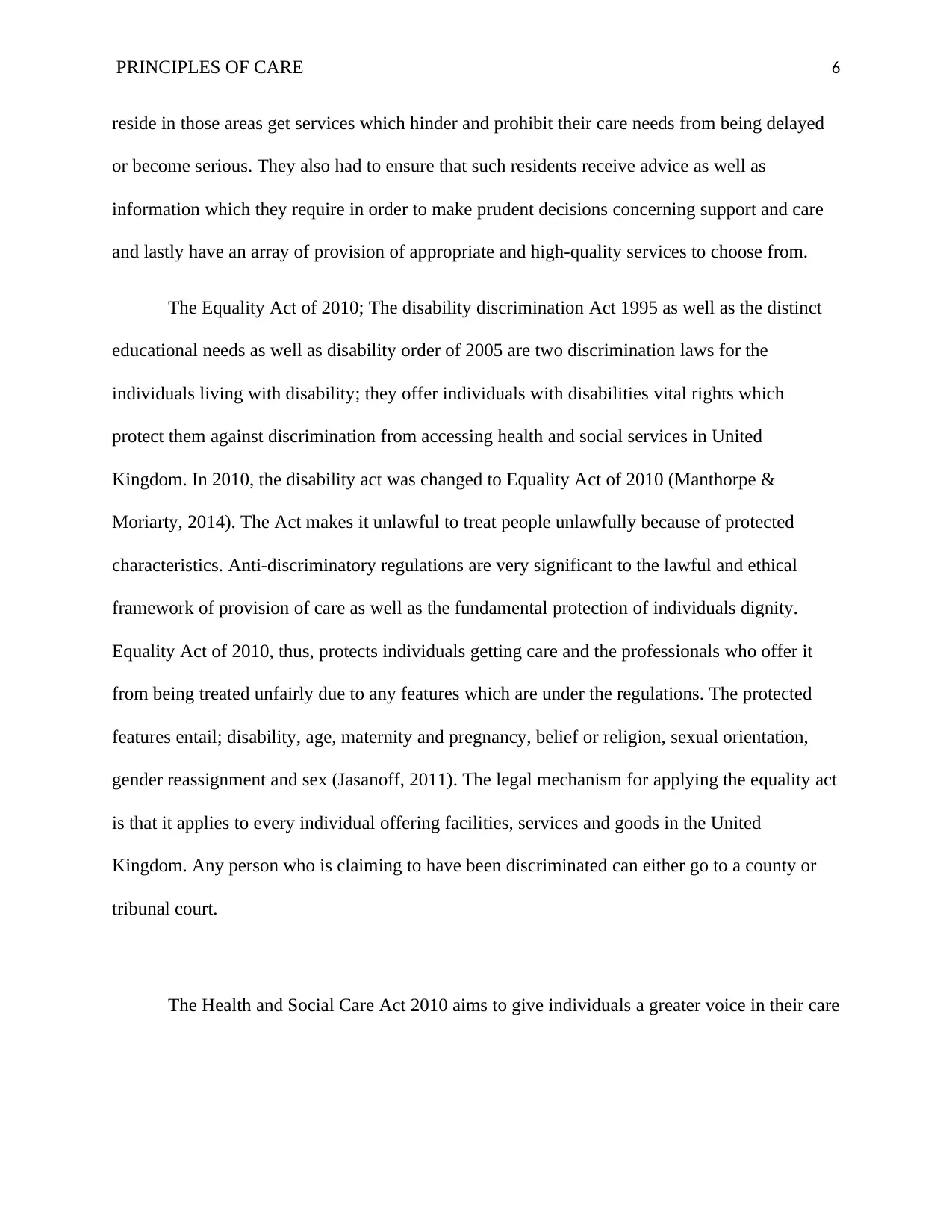
PRINCIPLES OF CARE 6
reside in those areas get services which hinder and prohibit their care needs from being delayed
or become serious. They also had to ensure that such residents receive advice as well as
information which they require in order to make prudent decisions concerning support and care
and lastly have an array of provision of appropriate and high-quality services to choose from.
The Equality Act of 2010; The disability discrimination Act 1995 as well as the distinct
educational needs as well as disability order of 2005 are two discrimination laws for the
individuals living with disability; they offer individuals with disabilities vital rights which
protect them against discrimination from accessing health and social services in United
Kingdom. In 2010, the disability act was changed to Equality Act of 2010 (Manthorpe &
Moriarty, 2014). The Act makes it unlawful to treat people unlawfully because of protected
characteristics. Anti-discriminatory regulations are very significant to the lawful and ethical
framework of provision of care as well as the fundamental protection of individuals dignity.
Equality Act of 2010, thus, protects individuals getting care and the professionals who offer it
from being treated unfairly due to any features which are under the regulations. The protected
features entail; disability, age, maternity and pregnancy, belief or religion, sexual orientation,
gender reassignment and sex (Jasanoff, 2011). The legal mechanism for applying the equality act
is that it applies to every individual offering facilities, services and goods in the United
Kingdom. Any person who is claiming to have been discriminated can either go to a county or
tribunal court.
The Health and Social Care Act 2010 aims to give individuals a greater voice in their care
reside in those areas get services which hinder and prohibit their care needs from being delayed
or become serious. They also had to ensure that such residents receive advice as well as
information which they require in order to make prudent decisions concerning support and care
and lastly have an array of provision of appropriate and high-quality services to choose from.
The Equality Act of 2010; The disability discrimination Act 1995 as well as the distinct
educational needs as well as disability order of 2005 are two discrimination laws for the
individuals living with disability; they offer individuals with disabilities vital rights which
protect them against discrimination from accessing health and social services in United
Kingdom. In 2010, the disability act was changed to Equality Act of 2010 (Manthorpe &
Moriarty, 2014). The Act makes it unlawful to treat people unlawfully because of protected
characteristics. Anti-discriminatory regulations are very significant to the lawful and ethical
framework of provision of care as well as the fundamental protection of individuals dignity.
Equality Act of 2010, thus, protects individuals getting care and the professionals who offer it
from being treated unfairly due to any features which are under the regulations. The protected
features entail; disability, age, maternity and pregnancy, belief or religion, sexual orientation,
gender reassignment and sex (Jasanoff, 2011). The legal mechanism for applying the equality act
is that it applies to every individual offering facilities, services and goods in the United
Kingdom. Any person who is claiming to have been discriminated can either go to a county or
tribunal court.
The Health and Social Care Act 2010 aims to give individuals a greater voice in their care
⊘ This is a preview!⊘
Do you want full access?
Subscribe today to unlock all pages.

Trusted by 1+ million students worldwide
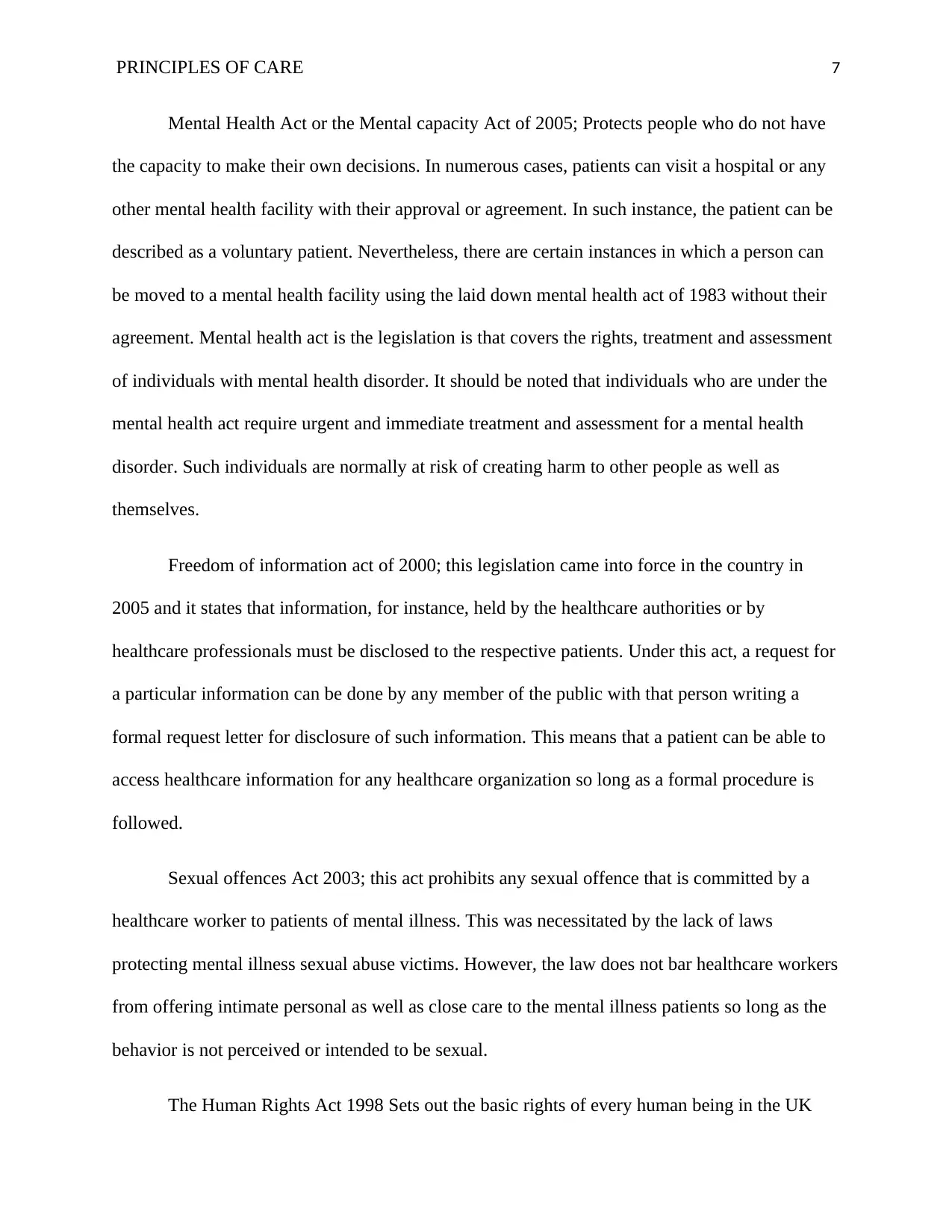
PRINCIPLES OF CARE 7
Mental Health Act or the Mental capacity Act of 2005; Protects people who do not have
the capacity to make their own decisions. In numerous cases, patients can visit a hospital or any
other mental health facility with their approval or agreement. In such instance, the patient can be
described as a voluntary patient. Nevertheless, there are certain instances in which a person can
be moved to a mental health facility using the laid down mental health act of 1983 without their
agreement. Mental health act is the legislation is that covers the rights, treatment and assessment
of individuals with mental health disorder. It should be noted that individuals who are under the
mental health act require urgent and immediate treatment and assessment for a mental health
disorder. Such individuals are normally at risk of creating harm to other people as well as
themselves.
Freedom of information act of 2000; this legislation came into force in the country in
2005 and it states that information, for instance, held by the healthcare authorities or by
healthcare professionals must be disclosed to the respective patients. Under this act, a request for
a particular information can be done by any member of the public with that person writing a
formal request letter for disclosure of such information. This means that a patient can be able to
access healthcare information for any healthcare organization so long as a formal procedure is
followed.
Sexual offences Act 2003; this act prohibits any sexual offence that is committed by a
healthcare worker to patients of mental illness. This was necessitated by the lack of laws
protecting mental illness sexual abuse victims. However, the law does not bar healthcare workers
from offering intimate personal as well as close care to the mental illness patients so long as the
behavior is not perceived or intended to be sexual.
The Human Rights Act 1998 Sets out the basic rights of every human being in the UK
Mental Health Act or the Mental capacity Act of 2005; Protects people who do not have
the capacity to make their own decisions. In numerous cases, patients can visit a hospital or any
other mental health facility with their approval or agreement. In such instance, the patient can be
described as a voluntary patient. Nevertheless, there are certain instances in which a person can
be moved to a mental health facility using the laid down mental health act of 1983 without their
agreement. Mental health act is the legislation is that covers the rights, treatment and assessment
of individuals with mental health disorder. It should be noted that individuals who are under the
mental health act require urgent and immediate treatment and assessment for a mental health
disorder. Such individuals are normally at risk of creating harm to other people as well as
themselves.
Freedom of information act of 2000; this legislation came into force in the country in
2005 and it states that information, for instance, held by the healthcare authorities or by
healthcare professionals must be disclosed to the respective patients. Under this act, a request for
a particular information can be done by any member of the public with that person writing a
formal request letter for disclosure of such information. This means that a patient can be able to
access healthcare information for any healthcare organization so long as a formal procedure is
followed.
Sexual offences Act 2003; this act prohibits any sexual offence that is committed by a
healthcare worker to patients of mental illness. This was necessitated by the lack of laws
protecting mental illness sexual abuse victims. However, the law does not bar healthcare workers
from offering intimate personal as well as close care to the mental illness patients so long as the
behavior is not perceived or intended to be sexual.
The Human Rights Act 1998 Sets out the basic rights of every human being in the UK
Paraphrase This Document
Need a fresh take? Get an instant paraphrase of this document with our AI Paraphraser
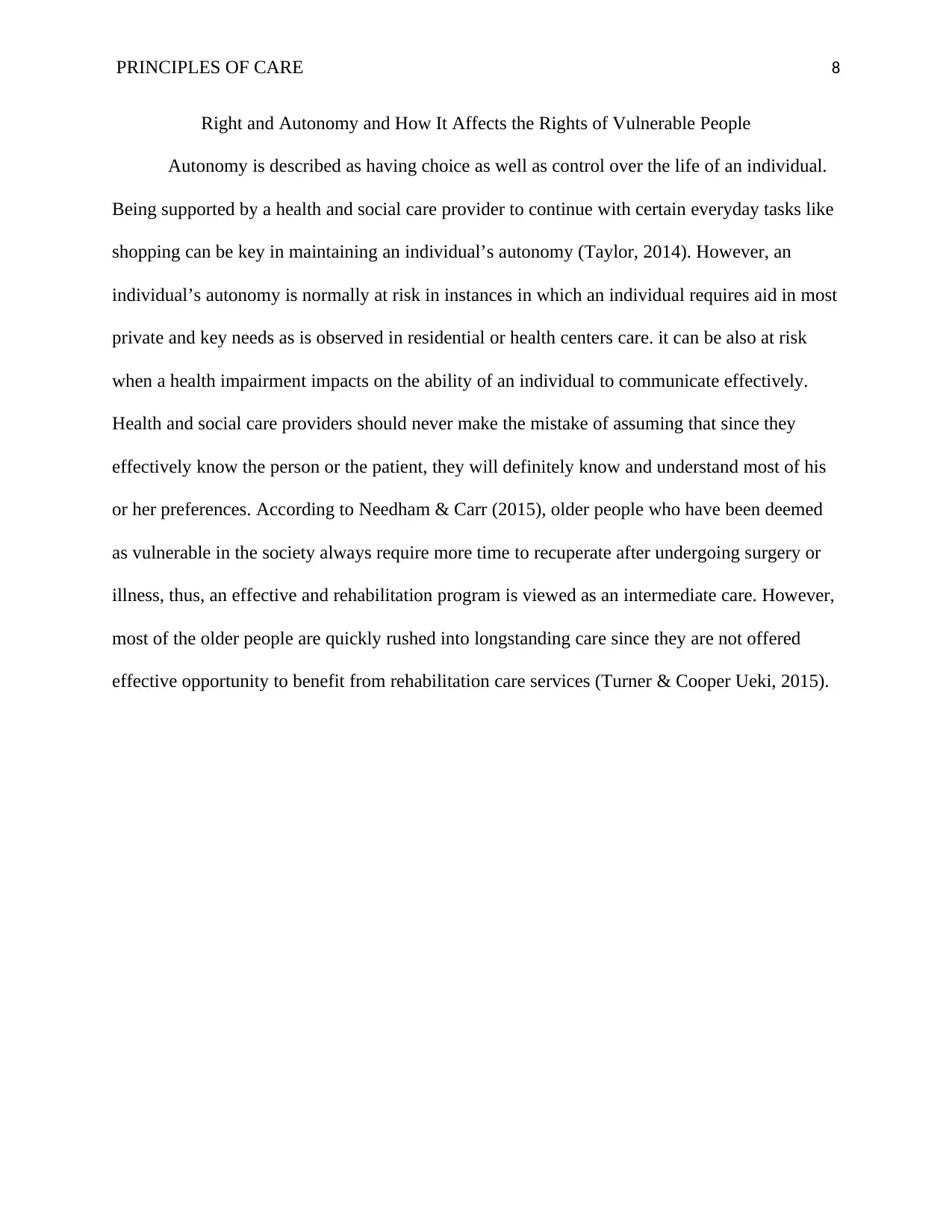
PRINCIPLES OF CARE 8
Right and Autonomy and How It Affects the Rights of Vulnerable People
Autonomy is described as having choice as well as control over the life of an individual.
Being supported by a health and social care provider to continue with certain everyday tasks like
shopping can be key in maintaining an individual’s autonomy (Taylor, 2014). However, an
individual’s autonomy is normally at risk in instances in which an individual requires aid in most
private and key needs as is observed in residential or health centers care. it can be also at risk
when a health impairment impacts on the ability of an individual to communicate effectively.
Health and social care providers should never make the mistake of assuming that since they
effectively know the person or the patient, they will definitely know and understand most of his
or her preferences. According to Needham & Carr (2015), older people who have been deemed
as vulnerable in the society always require more time to recuperate after undergoing surgery or
illness, thus, an effective and rehabilitation program is viewed as an intermediate care. However,
most of the older people are quickly rushed into longstanding care since they are not offered
effective opportunity to benefit from rehabilitation care services (Turner & Cooper Ueki, 2015).
Right and Autonomy and How It Affects the Rights of Vulnerable People
Autonomy is described as having choice as well as control over the life of an individual.
Being supported by a health and social care provider to continue with certain everyday tasks like
shopping can be key in maintaining an individual’s autonomy (Taylor, 2014). However, an
individual’s autonomy is normally at risk in instances in which an individual requires aid in most
private and key needs as is observed in residential or health centers care. it can be also at risk
when a health impairment impacts on the ability of an individual to communicate effectively.
Health and social care providers should never make the mistake of assuming that since they
effectively know the person or the patient, they will definitely know and understand most of his
or her preferences. According to Needham & Carr (2015), older people who have been deemed
as vulnerable in the society always require more time to recuperate after undergoing surgery or
illness, thus, an effective and rehabilitation program is viewed as an intermediate care. However,
most of the older people are quickly rushed into longstanding care since they are not offered
effective opportunity to benefit from rehabilitation care services (Turner & Cooper Ueki, 2015).
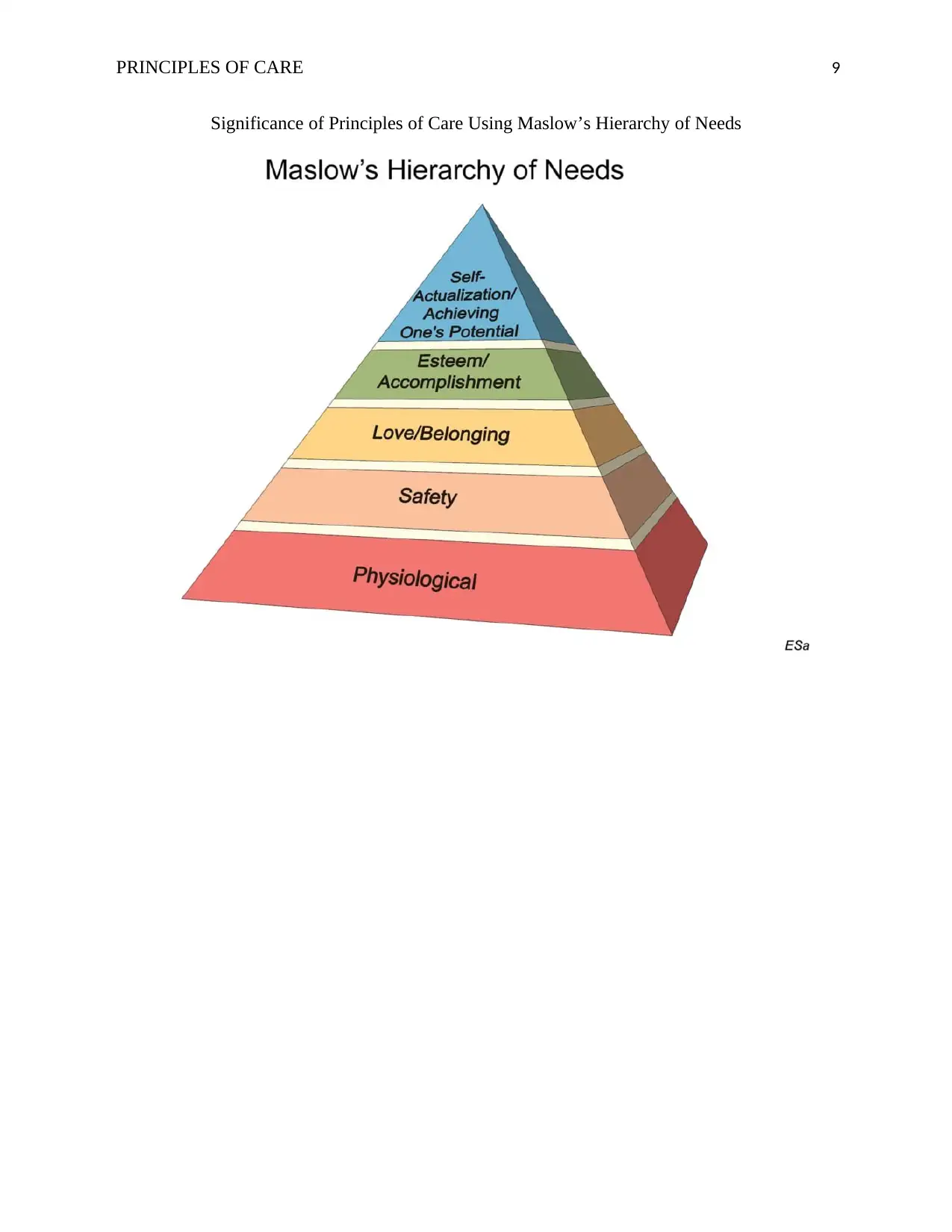
PRINCIPLES OF CARE 9
Significance of Principles of Care Using Maslow’s Hierarchy of Needs
Significance of Principles of Care Using Maslow’s Hierarchy of Needs
⊘ This is a preview!⊘
Do you want full access?
Subscribe today to unlock all pages.

Trusted by 1+ million students worldwide
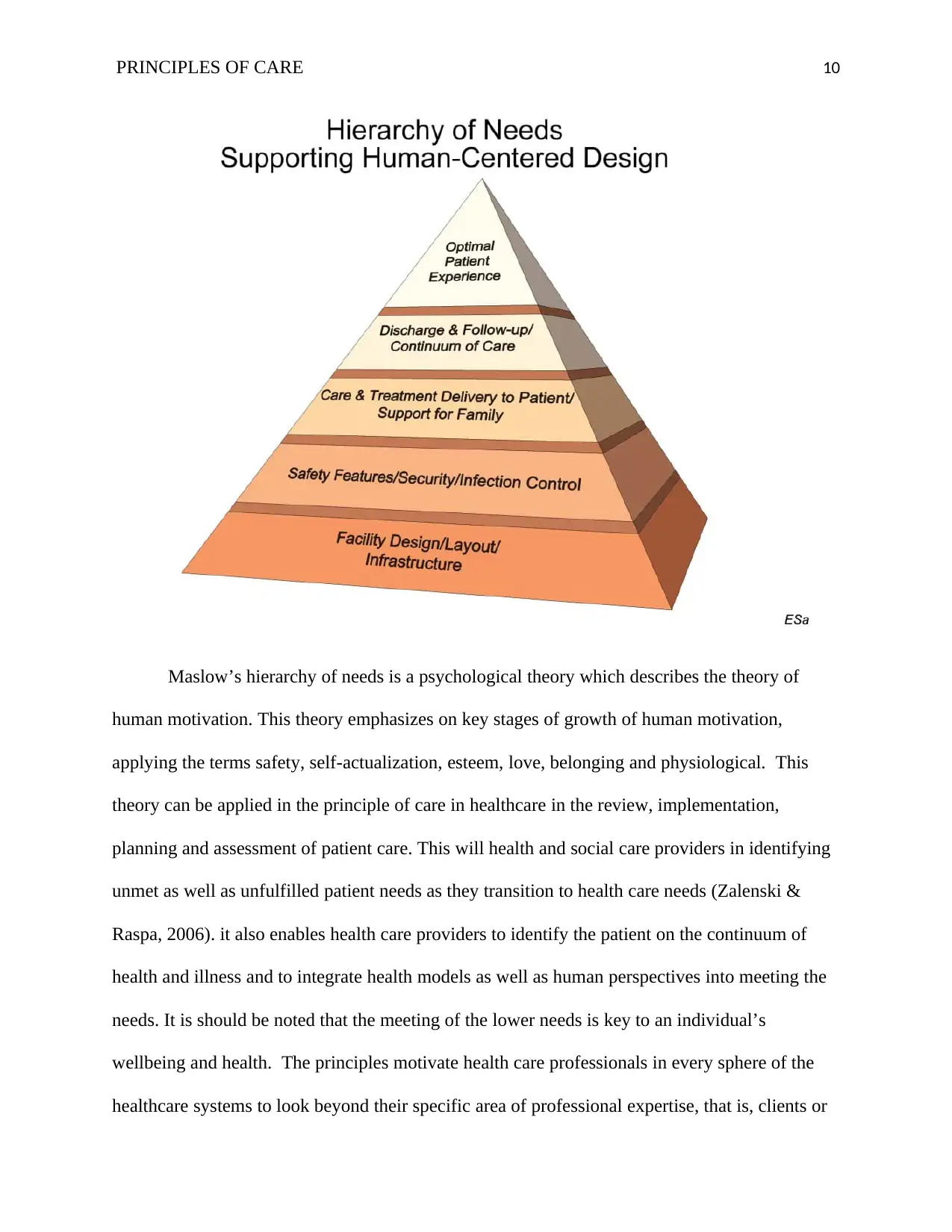
PRINCIPLES OF CARE 10
Maslow’s hierarchy of needs is a psychological theory which describes the theory of
human motivation. This theory emphasizes on key stages of growth of human motivation,
applying the terms safety, self-actualization, esteem, love, belonging and physiological. This
theory can be applied in the principle of care in healthcare in the review, implementation,
planning and assessment of patient care. This will health and social care providers in identifying
unmet as well as unfulfilled patient needs as they transition to health care needs (Zalenski &
Raspa, 2006). it also enables health care providers to identify the patient on the continuum of
health and illness and to integrate health models as well as human perspectives into meeting the
needs. It is should be noted that the meeting of the lower needs is key to an individual’s
wellbeing and health. The principles motivate health care professionals in every sphere of the
healthcare systems to look beyond their specific area of professional expertise, that is, clients or
Maslow’s hierarchy of needs is a psychological theory which describes the theory of
human motivation. This theory emphasizes on key stages of growth of human motivation,
applying the terms safety, self-actualization, esteem, love, belonging and physiological. This
theory can be applied in the principle of care in healthcare in the review, implementation,
planning and assessment of patient care. This will health and social care providers in identifying
unmet as well as unfulfilled patient needs as they transition to health care needs (Zalenski &
Raspa, 2006). it also enables health care providers to identify the patient on the continuum of
health and illness and to integrate health models as well as human perspectives into meeting the
needs. It is should be noted that the meeting of the lower needs is key to an individual’s
wellbeing and health. The principles motivate health care professionals in every sphere of the
healthcare systems to look beyond their specific area of professional expertise, that is, clients or
Paraphrase This Document
Need a fresh take? Get an instant paraphrase of this document with our AI Paraphraser
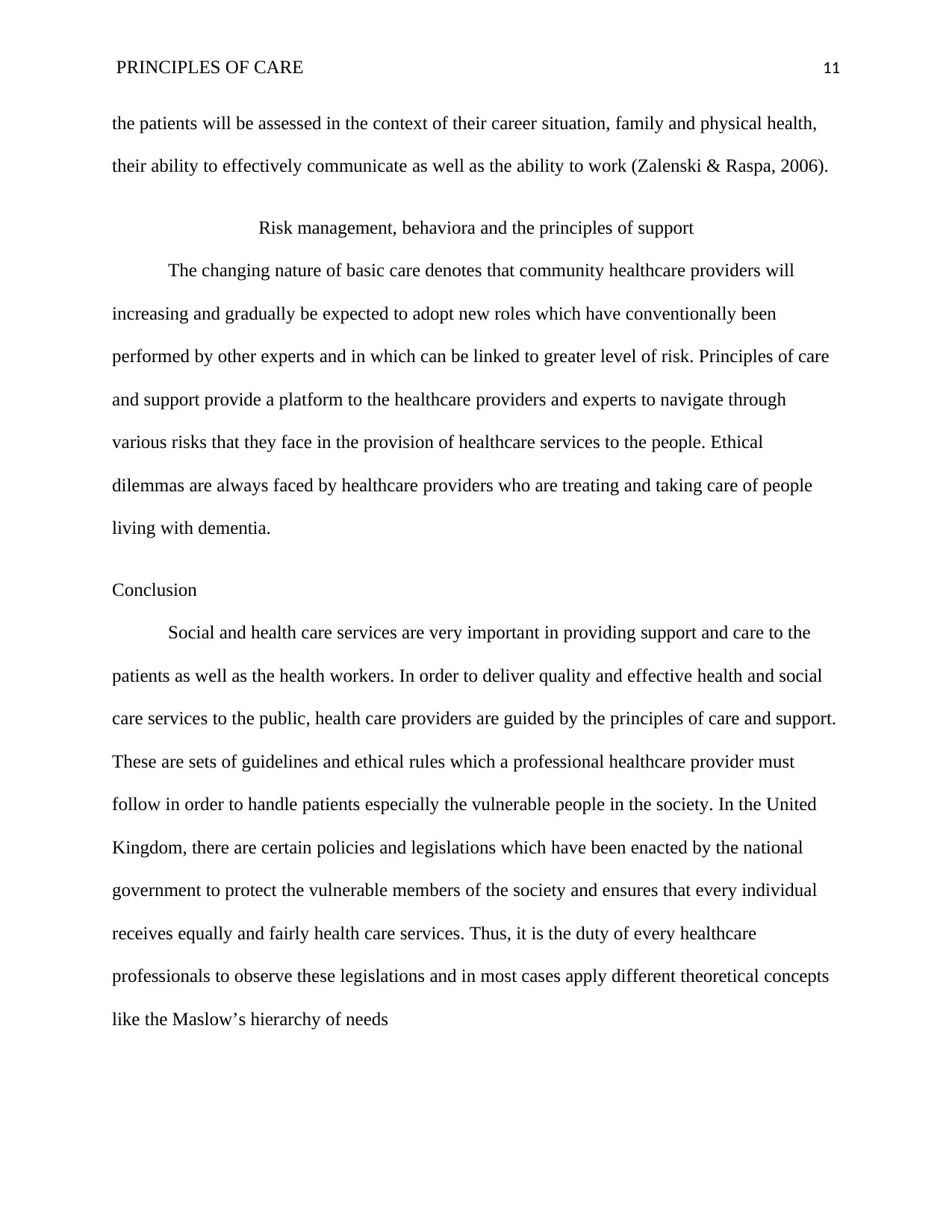
PRINCIPLES OF CARE 11
the patients will be assessed in the context of their career situation, family and physical health,
their ability to effectively communicate as well as the ability to work (Zalenski & Raspa, 2006).
Risk management, behaviora and the principles of support
The changing nature of basic care denotes that community healthcare providers will
increasing and gradually be expected to adopt new roles which have conventionally been
performed by other experts and in which can be linked to greater level of risk. Principles of care
and support provide a platform to the healthcare providers and experts to navigate through
various risks that they face in the provision of healthcare services to the people. Ethical
dilemmas are always faced by healthcare providers who are treating and taking care of people
living with dementia.
Conclusion
Social and health care services are very important in providing support and care to the
patients as well as the health workers. In order to deliver quality and effective health and social
care services to the public, health care providers are guided by the principles of care and support.
These are sets of guidelines and ethical rules which a professional healthcare provider must
follow in order to handle patients especially the vulnerable people in the society. In the United
Kingdom, there are certain policies and legislations which have been enacted by the national
government to protect the vulnerable members of the society and ensures that every individual
receives equally and fairly health care services. Thus, it is the duty of every healthcare
professionals to observe these legislations and in most cases apply different theoretical concepts
like the Maslow’s hierarchy of needs
the patients will be assessed in the context of their career situation, family and physical health,
their ability to effectively communicate as well as the ability to work (Zalenski & Raspa, 2006).
Risk management, behaviora and the principles of support
The changing nature of basic care denotes that community healthcare providers will
increasing and gradually be expected to adopt new roles which have conventionally been
performed by other experts and in which can be linked to greater level of risk. Principles of care
and support provide a platform to the healthcare providers and experts to navigate through
various risks that they face in the provision of healthcare services to the people. Ethical
dilemmas are always faced by healthcare providers who are treating and taking care of people
living with dementia.
Conclusion
Social and health care services are very important in providing support and care to the
patients as well as the health workers. In order to deliver quality and effective health and social
care services to the public, health care providers are guided by the principles of care and support.
These are sets of guidelines and ethical rules which a professional healthcare provider must
follow in order to handle patients especially the vulnerable people in the society. In the United
Kingdom, there are certain policies and legislations which have been enacted by the national
government to protect the vulnerable members of the society and ensures that every individual
receives equally and fairly health care services. Thus, it is the duty of every healthcare
professionals to observe these legislations and in most cases apply different theoretical concepts
like the Maslow’s hierarchy of needs
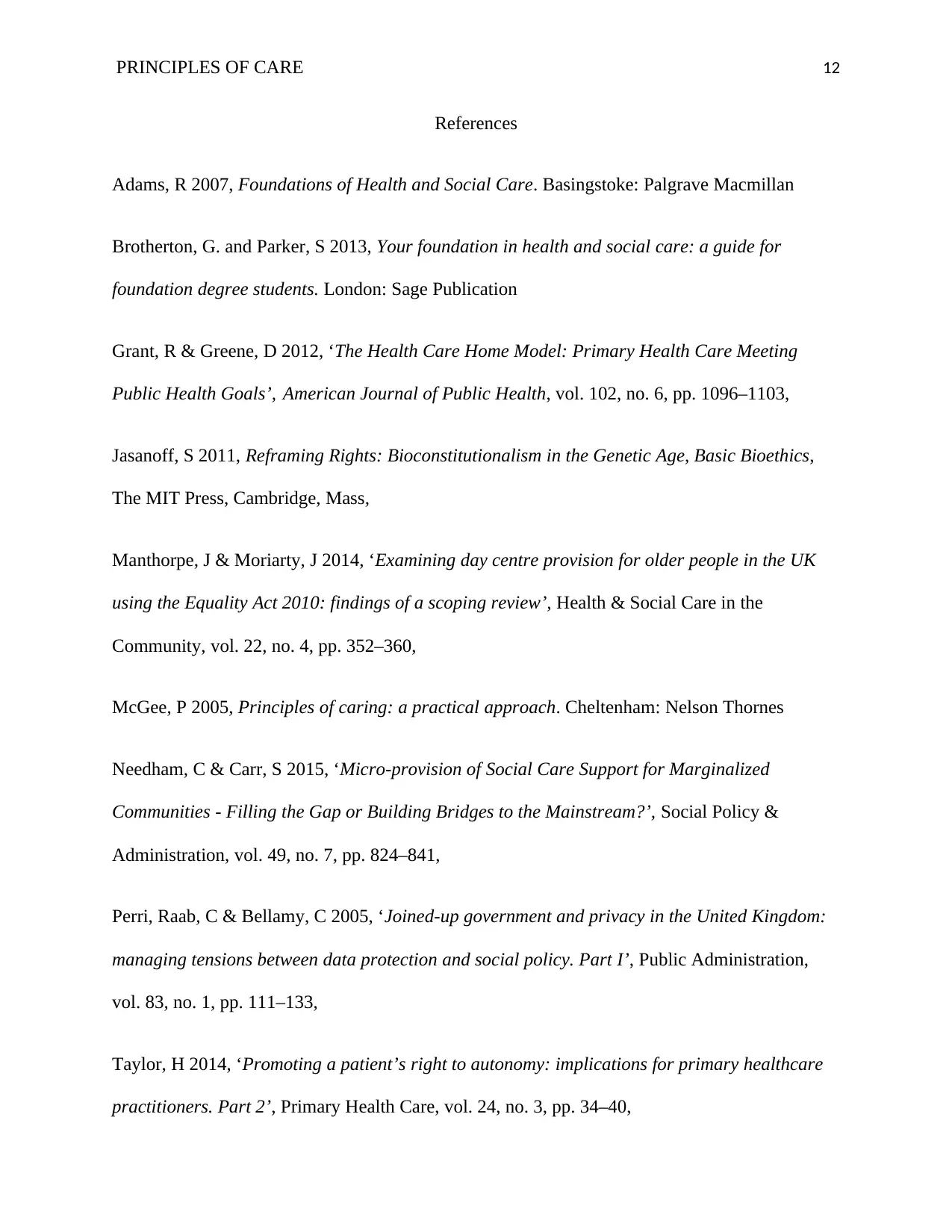
PRINCIPLES OF CARE 12
References
Adams, R 2007, Foundations of Health and Social Care. Basingstoke: Palgrave Macmillan
Brotherton, G. and Parker, S 2013, Your foundation in health and social care: a guide for
foundation degree students. London: Sage Publication
Grant, R & Greene, D 2012, ‘The Health Care Home Model: Primary Health Care Meeting
Public Health Goals’, American Journal of Public Health, vol. 102, no. 6, pp. 1096–1103,
Jasanoff, S 2011, Reframing Rights: Bioconstitutionalism in the Genetic Age, Basic Bioethics,
The MIT Press, Cambridge, Mass,
Manthorpe, J & Moriarty, J 2014, ‘Examining day centre provision for older people in the UK
using the Equality Act 2010: findings of a scoping review’, Health & Social Care in the
Community, vol. 22, no. 4, pp. 352–360,
McGee, P 2005, Principles of caring: a practical approach. Cheltenham: Nelson Thornes
Needham, C & Carr, S 2015, ‘Micro-provision of Social Care Support for Marginalized
Communities - Filling the Gap or Building Bridges to the Mainstream?’, Social Policy &
Administration, vol. 49, no. 7, pp. 824–841,
Perri, Raab, C & Bellamy, C 2005, ‘Joined-up government and privacy in the United Kingdom:
managing tensions between data protection and social policy. Part I’, Public Administration,
vol. 83, no. 1, pp. 111–133,
Taylor, H 2014, ‘Promoting a patient’s right to autonomy: implications for primary healthcare
practitioners. Part 2’, Primary Health Care, vol. 24, no. 3, pp. 34–40,
References
Adams, R 2007, Foundations of Health and Social Care. Basingstoke: Palgrave Macmillan
Brotherton, G. and Parker, S 2013, Your foundation in health and social care: a guide for
foundation degree students. London: Sage Publication
Grant, R & Greene, D 2012, ‘The Health Care Home Model: Primary Health Care Meeting
Public Health Goals’, American Journal of Public Health, vol. 102, no. 6, pp. 1096–1103,
Jasanoff, S 2011, Reframing Rights: Bioconstitutionalism in the Genetic Age, Basic Bioethics,
The MIT Press, Cambridge, Mass,
Manthorpe, J & Moriarty, J 2014, ‘Examining day centre provision for older people in the UK
using the Equality Act 2010: findings of a scoping review’, Health & Social Care in the
Community, vol. 22, no. 4, pp. 352–360,
McGee, P 2005, Principles of caring: a practical approach. Cheltenham: Nelson Thornes
Needham, C & Carr, S 2015, ‘Micro-provision of Social Care Support for Marginalized
Communities - Filling the Gap or Building Bridges to the Mainstream?’, Social Policy &
Administration, vol. 49, no. 7, pp. 824–841,
Perri, Raab, C & Bellamy, C 2005, ‘Joined-up government and privacy in the United Kingdom:
managing tensions between data protection and social policy. Part I’, Public Administration,
vol. 83, no. 1, pp. 111–133,
Taylor, H 2014, ‘Promoting a patient’s right to autonomy: implications for primary healthcare
practitioners. Part 2’, Primary Health Care, vol. 24, no. 3, pp. 34–40,
⊘ This is a preview!⊘
Do you want full access?
Subscribe today to unlock all pages.

Trusted by 1+ million students worldwide
1 out of 13
Related Documents
Your All-in-One AI-Powered Toolkit for Academic Success.
+13062052269
info@desklib.com
Available 24*7 on WhatsApp / Email
![[object Object]](/_next/static/media/star-bottom.7253800d.svg)
Unlock your academic potential
Copyright © 2020–2026 A2Z Services. All Rights Reserved. Developed and managed by ZUCOL.



